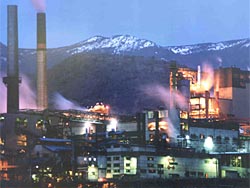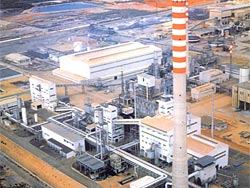Basic developments
Pyrometallurgy
Innovations:
- Technology to process various lead-bearing raw materials by KIVCET method
- Technology to process lead-acid batteries scrap
Technology to process various lead-bearing raw materials by KIVCET method
KIVCET method of lead-bearing raw materials processing is based on the combination the following processes which are continuously performed in one unit of original construction: charge roasting and smelting processes in pulverize conditions in oxygen atmosphere; oxide melt recovery in a layer of carbon material; and settling of the poor in lead melt form electric furnace. The charge is roasted and melted in oxygen atmosphere and thr produced oxide undergoes carbon-thermal reduction with high recovery of: precious metals - into lead bullion, copper - into matte, zinc – into fumes or slag, sulfur - into rich gases.
 |
KIVCET furnace |
Initially KIVCET-process was developed to process sulfide copper-zinc and lead-zinc raw materials.
Then the process was improved, allowing to use it for processing of complex materials such as: lead-silver, lead-copper-zinc concentrates and oxidized raw materials (for example, residues from zinc cinder leaching and pressure processing of zinc concentrates, residues from jarosite- and -goethite processes, converter dusts and other industrial products).
Under VNIItsvetmet license 5 KIVCET complexes in the Republic of Kazakhstan and abroad were constructed:
| Location | Raw materials | Metal production capacity of the plant (thousands tons per year) |
| Kazakhstan, Glubokoye village | 100% copper-zinc concentrates | 15 of copper in matte |
| Bolivia, Potosi city | 100% lead concentrates | 25 of lead |
| Kazakhstan, Ust-Kamenogorsk city | 75-80% lead concentrates, 20-25% residues form zinc plant |
47 of lead |
| Italy, Portovesme city | 40-45% lead concentrates, 50-55 residues form zinc plant, accumulator paste and etc. |
100 of lead |
| Canada, Trail city | 20-25% lead concentrates, 75-80% residues form zinc plant and etc. |
120 of lead |
 |
 |
| Lead plant using KIVCET Technology in Trail, Canada | Lead plant using KIVCET Technology in Portovesme, Italy |
In 2008-2009, VNIItsvetmet signed license agreements for KIVCET technology with the largest Chinese Companies:
- Jiangxi Copper Corporation – for construction of new lead plant with production capacity of 100 000 tons of lead per year;
- Zhuzhou Smelter Group Co. – for modernization of lead plant, using KIVCET technology, with production capacity of 120 000 tons of lead per year.
The plants are going to be industrially commissioned in 2011.
KIVCET units engineering is accomplished by Italian Company “Forni Engineering”, and general designer of all Lead Plant is Changsha Design and Research Institute of Nonferrous Metallurgy (China).
VNIItsvetmet has Cooperation Agreement with Changsha Institute. According to this Agreement VNIItsvetmet’s partner promotes Kazakhstan Technology into Chinese Marker of Lead Producers.
KIVCET process is patented in the following countries, producing lead: Kazakhstan, Russia, PRC, DPRK, India, Brazil, Bolivia, Mexico and Chile.
Technology to process lead-acid batteries scrap
Technology is based on hydroseparation of crushed battery scrap with the production of 4 products: metal fraction, sulphate-oxide fraction, polypropylene and chloride-containing organics. Process is mechanized.
Metal and sulfate-oxide fractions are treated by smelting, e.g. in electric furnace.
Process allows to recover 98% of lead and to improve the ecology of lead production. Technology is implemented at Leninogorsky lead plant.
Technology and equipment are protected by patents of the Republic of Kazakhstan and Russia.
Process flowsheet:






